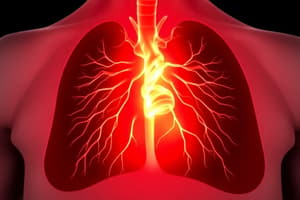Podcast
Questions and Answers
What is the primary characteristic of shock?
What is the primary characteristic of shock?
- High arterial pressure
- Adequate oxygen delivery
- Increased blood volume
- Global tissue hypo-perfusion (correct)
Which type of shock is primarily caused by inadequate blood or plasma volume?
Which type of shock is primarily caused by inadequate blood or plasma volume?
- Cardiogenic shock
- Septic shock
- Neurogenic shock
- Hypovolemic shock (correct)
What is the main goal of the body during shock?
What is the main goal of the body during shock?
- Increase respiratory rate
- Maintain cerebral and cardiac perfusion (correct)
- Lower blood pressure
- Decrease heart rate
In which stage of shock does tissue hypoperfusion and metabolic imbalances occur?
In which stage of shock does tissue hypoperfusion and metabolic imbalances occur?
Which of the following is a physiological response to inadequate systemic oxygen delivery during shock?
Which of the following is a physiological response to inadequate systemic oxygen delivery during shock?
Which cellular response indicates a serious effect of shock on the body's cells?
Which cellular response indicates a serious effect of shock on the body's cells?
What complicates the effect of shock across multiple organ systems, leading to end organ failure?
What complicates the effect of shock across multiple organ systems, leading to end organ failure?
Which type of shock involves loss of vascular tone due to spinal cord injury?
Which type of shock involves loss of vascular tone due to spinal cord injury?
What is the first stage of shock characterized by compensatory responses in the body?
What is the first stage of shock characterized by compensatory responses in the body?
Which type of shock results from an overwhelming infection leading to severe inflammation?
Which type of shock results from an overwhelming infection leading to severe inflammation?
In which type of shock is there an inadequate heart function leading to insufficient blood circulation?
In which type of shock is there an inadequate heart function leading to insufficient blood circulation?
What is a common physiological response during the progressive stage of shock?
What is a common physiological response during the progressive stage of shock?
What characterizes the irreversible stage of shock?
What characterizes the irreversible stage of shock?
Flashcards
Shock
Shock
Inadequate oxygen delivery to tissues, causing global tissue hypo-perfusion and metabolic acidosis. Arterial pressure is usually low.
Cardiogenic Shock
Cardiogenic Shock
Shock caused by the heart's inability to pump effectively.
Hypovolemic Shock
Hypovolemic Shock
Shock resulting from low blood volume, often due to loss of blood or fluids.
Septic Shock
Septic Shock
Signup and view all the flashcards
Neurogenic Shock
Neurogenic Shock
Signup and view all the flashcards
Anaphylactic Shock
Anaphylactic Shock
Signup and view all the flashcards
Stages of Shock (Stage I)
Stages of Shock (Stage I)
Signup and view all the flashcards
Stages of Shock (Stage II)
Stages of Shock (Stage II)
Signup and view all the flashcards
What is Shock?
What is Shock?
Signup and view all the flashcards
Types of Shock
Types of Shock
Signup and view all the flashcards
Stage I Shock
Stage I Shock
Signup and view all the flashcards
Stage II Shock
Stage II Shock
Signup and view all the flashcards
Stage III Shock
Stage III Shock
Signup and view all the flashcards
Study Notes
Physiology of Circulatory Shock
- Shock is defined as inadequate oxygen delivery to tissues, resulting in global tissue hypo-perfusion and metabolic acidosis.
- Arterial pressure is typically low in shock.
Learning Objectives
- Define shock
- List different types of shock
- Enumerate the stages of shock
Definition of Shock
- Inadequate oxygen delivery to tissues
- Results in global tissue hypo-perfusion and metabolic acidosis
- Arterial pressure is usually low
Types of Shock
- Cardiogenic: Failure of the myocardial pump (e.g., myocardial infarction, arrhythmias, pulmonary embolism)
- Hypovolemic: Inadequate blood/plasma volume (e.g., hemorrhage, fluid loss from vomiting, diarrhea, burns, trauma)
- Septic: Vasodilation and endothelial injury caused by Gram-positive or Gram-negative bacteria
- Neurogenic: Loss of vascular tone (vasodilation), often from spinal cord injury
- Anaphylactic: IgE-mediated hypersensitivity reaction, causing vasodilation
Understanding the Shock
- Inadequate systemic oxygen delivery triggers autonomic responses to maintain oxygen delivery.
- The body's primary goal during shock is to maintain cerebral and cardiac perfusion.
- The sympathetic nervous system plays a crucial role, releasing norepinephrine, epinephrine, dopamine, and cortisol. This leads to vasoconstriction, increased heart rate, and increased cardiac contractility (output).
- The renin-angiotensin axis promotes water and sodium conservation and vasoconstriction, increasing blood volume and pressure.
Cellular responses during shock
- ATP depletion and ion pump dysfunction
- Cellular edema
- Hydrolysis of cellular membranes leading to cellular death
Endothelial inflammation and disruption during shock
- Inability to deliver sufficient oxygen to meet metabolic demands
Result of shock
- Lactic acidosis
- Cardiovascular insufficiency
- Increased metabolic demands
Multi-Organ Dysfunction Syndrome (MODS)
- Cardiac depression
- Respiratory distress
- Renal failure
- Results in end-organ failure
Stages of Shock
- Stage I: Non-progressive and compensated, with compensatory mechanisms activated.
- Stage II: Progressive and decompensated, involving tissue hypo-perfusion and metabolic imbalances.
- Stage III: Irreversible, leading to incurred cellular damage, tissue injury, and eventual death.
Studying That Suits You
Use AI to generate personalized quizzes and flashcards to suit your learning preferences.




